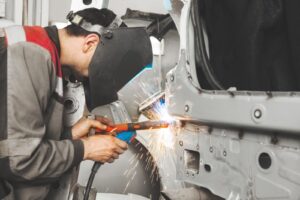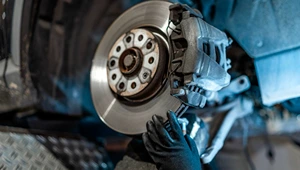Looking to change the way your vehicle rides, handles, or looks? If you’ve ever searched “custom suspension” online, you’ve probably come across a ton of options—some exciting, some overwhelming. Suspension upgrades aren’t just for off-roaders or show cars. Many everyday drivers are turning to custom setups to improve comfort, performance, or style.
Before you start picking out parts or booking an appointment at a custom suspension shop, here’s what you need to know about how suspension upgrades work, what your options are, and how to avoid common pitfalls.
What Does Custom Suspension Mean?
A custom suspension refers to any modification made to your vehicle’s original suspension system to improve its performance, appearance, or both. This could mean anything from replacing factory shocks with adjustable ones to installing a full custom suspension lift kit for more ground clearance.
Depending on your goals, customizations can be subtle or extreme. Some are for function, like handling or towing, while others are for form, like getting that perfect lowered stance or aggressive lifted look.
Why Do Vehicle Owners Consider Suspension Upgrades?
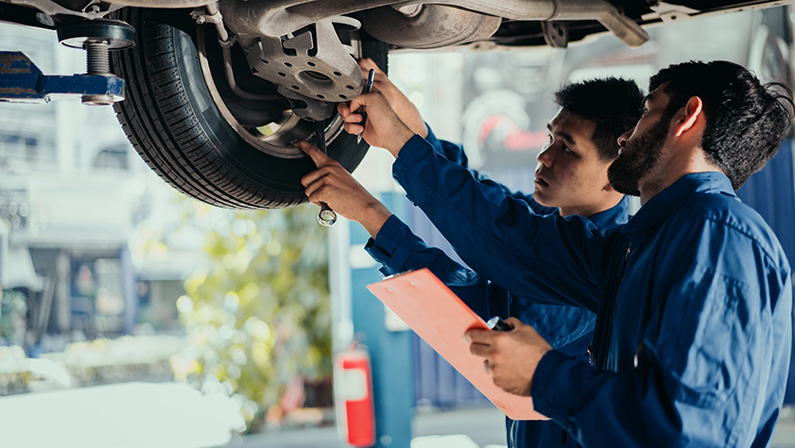
Many drivers choose to modify their suspension systems to meet specific performance, comfort, or style needs.
Here are some of the most common reasons people invest in custom suspension upgrades:
Improved Ride Comfort
A stock suspension system is built to serve the “average” driver on a mix of roads. But if you frequently drive on rough or uneven surfaces, custom tuning can make a big difference. Swapping out factory shocks for performance dampers or adjustable components allows your suspension to absorb bumps more effectively, reducing jarring vibrations and improving overall ride quality, especially over potholes, gravel, or uneven terrain.
Better Handling and Stability
If your vehicle feels floaty during turns or you notice a lot of body roll when changing lanes, a suspension upgrade can help. Installing stiffer custom suspension springs, sway bars, or lowering components brings the vehicle’s center of gravity closer to the road.
Increased Ground Clearance
For off-roaders and those who live in rural areas, a custom suspension lift can be a game changer. Lift kits raise your vehicle’s body or suspension, giving it the clearance needed to drive over rocks, deep ruts, snow, or mud without scraping the undercarriage. A lift also allows you to run larger tires for better off-road grip and rugged aesthetics.
Aesthetic Preferences
Sometimes, it’s all about how your vehicle looks. A lowered stance gives sedans and sports cars a sleek, aggressive appearance. On the flip side, a lifted truck turns heads with its commanding presence and rugged personality. Custom suspension lift kits or lowering kits can help you dial in the perfect look, whether you’re going for slammed, sporty, or sky-high.
Towing or Hauling Performance
If you frequently tow trailers or carry heavy cargo, your stock suspension might struggle to keep things level and stable. Upgrading to heavy-duty springs, shocks, or air suspension helps distribute weight more evenly, reduces rear-end sag, and improves control under load. This makes towing safer and more comfortable for both you and your vehicle.
In short, suspension upgrades help personalize your ride for how you drive—and how you want your vehicle to perform.
What Types of Custom Suspension Systems Are Available?
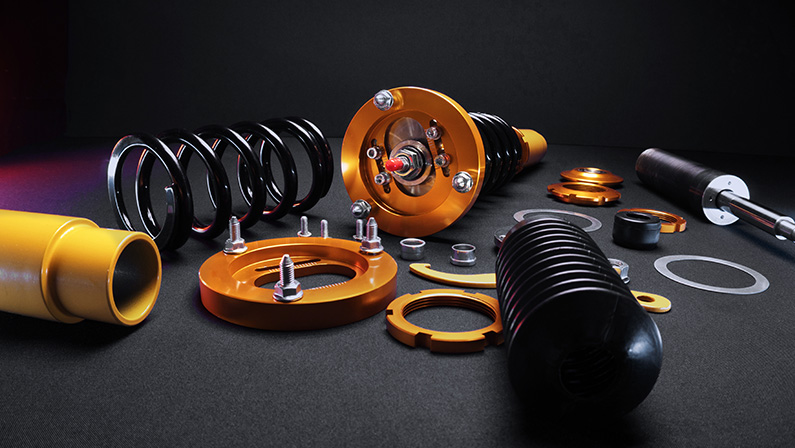
There’s a wide range of suspension modifications, and the best one for you depends on your vehicle and goals.
Some of the most common include:
- Lift kits – A custom suspension lift kit raises your vehicle’s height. Perfect for off-roading, it creates room for larger tires and increases underbody clearance.
- Lowering kits – These reduce ride height to improve handling and give your car a sportier look.
- Air suspension – Airbags replace traditional springs, allowing adjustable height at the push of a button.
- Performance springs and shocks – Upgrading to custom suspension springs and adjustable dampers improves stability, cornering, and overall responsiveness.
- Coilovers – These combine shocks and springs into one adjustable unit, ideal for tuning ride height and handling.
Each system has its pros and cons, so it’s important to work with a reputable shop that understands your specific needs.
How Do Suspension Upgrades Affect Ride Quality and Performance?
Done right, a custom suspension can dramatically improve how your vehicle handles and feels.
But the results depend on your setup:
- Improved control – Stiffer springs and performance shocks reduce body roll and improve responsiveness.
- Enhanced comfort – Air suspension and upgraded shocks can absorb bumps more effectively, especially on uneven roads.
- Better weight distribution – Ideal for trucks or SUVs that carry heavy loads or tow trailers.
- Adjustability – Some setups let you change ride height or stiffness based on driving conditions.
Of course, poor-quality parts or improper installation can do the opposite, leading to a rough ride or safety concerns. That’s why working with a custom suspension shop that understands balance is so important.
What Factors Should You Consider Before Upgrading Your Suspension?
Before diving into a suspension upgrade, take time to think through the following:
Your Driving Style
Think about how and where you spend most of your time behind the wheel. Do you drive off-road or on rugged trails? Are you mainly commuting on highways and city roads? Planning to take your car to the track? Off-roaders may benefit from a custom suspension lift, while daily drivers might prefer a comfort-focused setup. Lowering kits and performance springs are better suited for those looking to improve handling on smoother surfaces. Matching your suspension to your driving habits ensures you get the performance and comfort that you need.
Your Budget
Suspension upgrades vary widely in price. Besides the cost of the parts, you also need to account for labor, post-installation alignment, and any additional components like extended brake lines or upgraded sway bars. Coilovers and air suspension systems typically cost more than basic shocks or springs. Knowing what you’re comfortable spending helps you set realistic expectations and avoid surprises.
Vehicle Type
Some vehicles are more modification-friendly than others. Trucks and SUVs are often easier to lift, while performance sedans or sports cars have more aftermarket support for lowering kits. Older or less common vehicles may require custom fabrication or harder-to-find components, which can raise costs and complexity. Make sure you understand what your vehicle can handle and what parts are actually available.
Local Laws and Inspection Requirements
Not all suspension modifications are legal everywhere. Some states or cities have restrictions on how high or low you can go. Installing a custom suspension lift kit might lead to issues during inspections or cause you to fail emissions or roadworthiness checks. Before making changes, check local regulations to ensure your build will stay street-legal.
Future Plans and Add-Ons
Are you planning to add larger wheels or tires? A trailer hitch? Roof racks or additional weight from accessories? Your suspension setup should take future changes into account so you don’t end up needing a second upgrade down the line. Choosing a flexible system now can save time and money later.
Taking all of this into account will help you choose a system that fits not just your car, but your lifestyle.
How Much Does a Custom Suspension Upgrade Typically Cost?
Costs vary widely depending on the type of system you choose:
- Custom suspension springs or shocks – $300 to $800 (plus labor)
- Coilover kits – $1,000 to $2,500
- Air suspension systems – $2,500 and up
- Custom suspension lift kits – $1,500 to $5,000, depending on vehicle size and complexity
Labor and alignment services add to the total cost. Check out this breakdown on suspension repair costs to better understand what goes into pricing.
Should You Choose DIY or Professional Installation?
If you’re mechanically inclined, some basic spring or shock upgrades might be manageable at home. But for anything involving frame modification, air systems, or full lift kits, professional installation is the safer route.
Here’s why a custom suspension shop is worth considering:
- They know the right specs for your vehicle
- They’ll properly align everything post-installation
- You get warranty coverage on parts and labor
- They can catch issues early, like worn bushings or mounting problems
Unless you have the tools and experience, leaving it to the pros ensures everything functions properly and safely.
How Do You Maintain a Custom Suspension System?
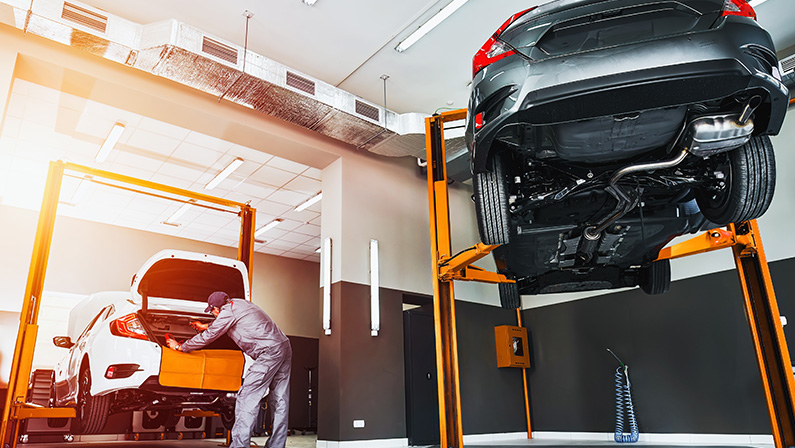
Like any major upgrade, a custom suspension requires upkeep.
Here’s how to keep it in top condition:
1. Check the parts often
Look at your suspension every few months. Watch for signs of damage like cracked bushings, fluid leaks, or rust around bolts and mounts.
2. Keep it clean
Dirt, mud, and road salt can wear down parts over time. After off-roading or winter driving, rinse off your suspension to prevent buildup and corrosion.
3. Watch your alignment and tires
Lifted or lowered setups can throw off your alignment faster than stock ones. If your tires wear unevenly or the steering feels off, get it checked.
4. Lubricate moving parts
Some suspension kits need grease now and then. This keeps joints from squeaking or seizing up.
5. Get a pro to inspect it
Have a shop check your suspension once a year. They can spot small issues before they turn into big repairs.
With proper care, your custom suspension can last for years and continue performing at its best.
What Are the Risks of Improper Suspension Modifications?
Upgrading suspension affects how your vehicle handles, brakes, and performs.
Done incorrectly, it can create serious issues like:
- Poor handling or unsafe steering
- Premature tire wear due to bad alignment
- Brake line strain from incorrect lift height
- Unbalanced ride height leading to sag or scraping
- Suspension failure under load
To avoid these risks, always work with qualified technicians and use high-quality parts that are designed to work with your specific vehicle model.
Ready to Upgrade? Here’s Where to Start
A suspension upgrade can completely transform your driving experience, from smoother handling to a more aggressive stance or trail-ready capability. But choosing the right parts and working with trusted professionals makes all the difference.
If you’re looking for expert help with custom suspension in Houston, TX, visit Status Automotive & Collision. Our team offers complete suspension services including installation of custom suspension lift kits, performance springs, and diagnostic support for a ride that looks and feels exactly how you want it.
From repairs to full upgrades, Status Automotive & Collision is the go-to shop Houston drivers trust when it comes to suspension performance and reliability.

